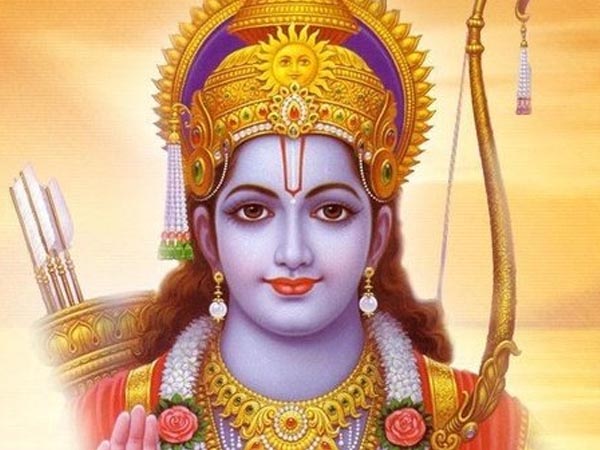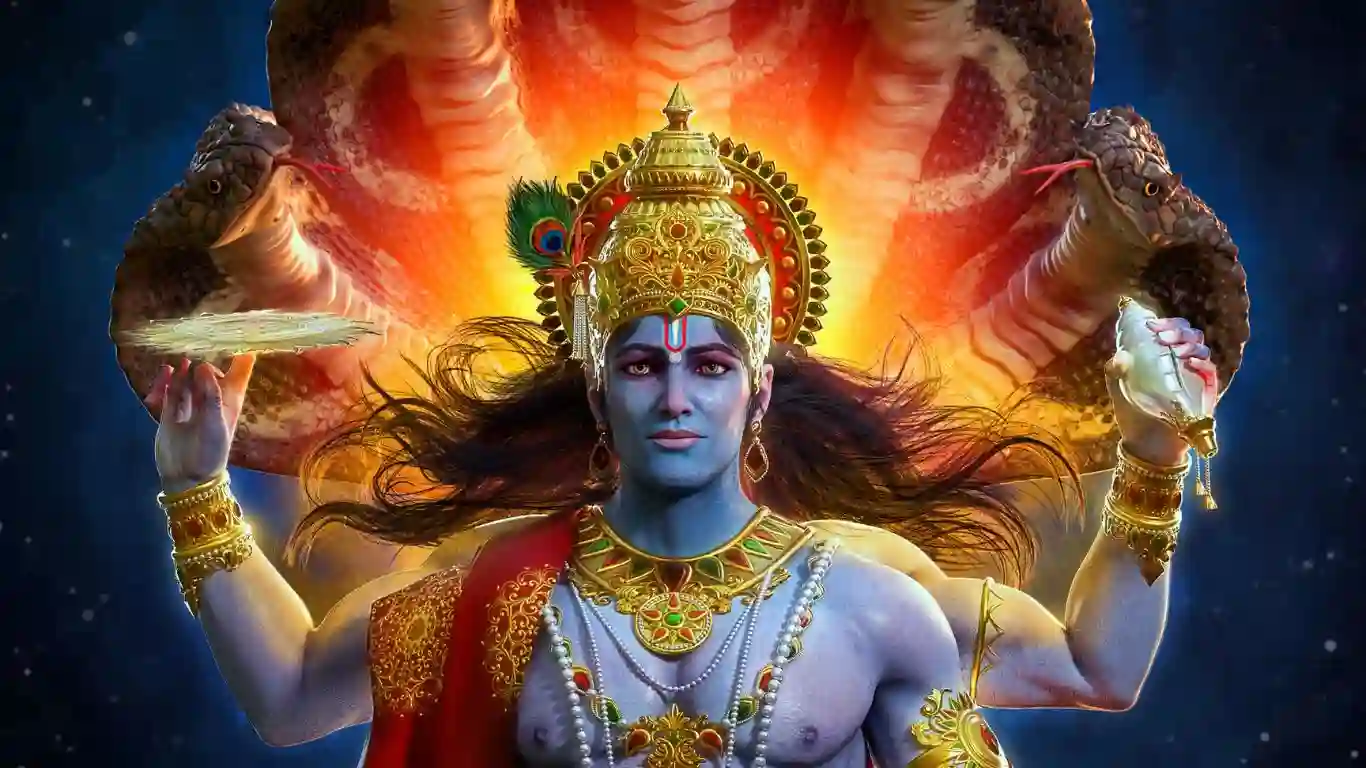About Lord Vishnu

"Divine Grace and Protection: The Power of Lord Vishnu"
Lord Vishnu is a really important god in Hinduism, and he's known as the protector and preserver of the universe. You'll often see him depicted with a cool dark blue color, four arms, and he holds different special objects. One of the coolest things about Vishnu is that he has these things called avatars, where he takes on different forms to bring balance and goodness to the world. You might have heard of Rama, Krishna, and Buddha - they're all avatars of Lord Vishnu! Vishnu is usually shown with his consort, Goddess Lakshmi, who represents wealth and prosperity. They make a great team, with Vishnu taking care of things and Lakshmi bringing in abundance.
Vishnu has some really cool symbols associated with him too. He's got this awesome spinning disc-like weapon called the Sudarshana Chakra, a conch shell that represents the sound of creation, a lotus flower that stands for purity and beauty, and a mace that shows his strength. People love and worship Vishnu all over the world. They chant his thousand names, which are called the Vishnu Sahasranama, and they do all sorts of devotional practices like praying, meditating, and singing hymns.
In Hinduism, there's this special branch called Vaishnavism, and it's all about worshipping Lord Vishnu as the top god. It has lots of different traditions and groups that follow their own beliefs and practices. Vishnu is a really compassionate and kind god who looks out for the universe and guides people toward doing what's right. He's an important figure in Hindu mythology, and people really love and respect him.
What is special about Vishnu?

Preserver and Protector: Vishnu is believed to play a crucial role in maintaining the balance of the universe. As the preserver and protector, he ensures the continuity of creation and safeguards it from threats and chaos. This responsibility makes him a central figure in Hindu mythology.
Avatars: One of the most remarkable aspects of Lord Vishnu is his avatars. He takes on different forms to descend to Earth and restore righteousness whenever it is threatened. His avatars, such as Rama and Krishna, are celebrated for their extraordinary deeds, teachings, and their impact on human history and spiritual evolution.
Compassion and Benevolence: Vishnu is revered for his compassionate nature and deep concern for humanity. He is known for his willingness to listen to the prayers and pleas of devotees, providing comfort, guidance, and protection. Vishnu's compassionate nature is a source of solace and inspiration for millions of worshippers.
Consort: Goddess Lakshmi, the goddess of wealth and prosperity, is considered the divine consort of Lord Vishnu. Their union represents the harmonious balance of preservation and abundance, symbolizing the importance of both material and spiritual prosperity.
Symbolism and Iconography: Lord Vishnu is associated with various symbols and objects that hold deep significance. His iconic attributes, such as the Sudarshana Chakra (the disc-like weapon), the conch shell, the lotus flower, and the mace, represent his divine powers, cosmic order, purity, and strength.
Devotion and Worship: Vishnu has a vast following, and his devotees engage in deep devotion and worship. Many rituals, prayers, and hymns are dedicated to him, expressing love, and gratitude, and seeking his blessings. The Vishnu Sahasranama, a sacred text containing a thousand names of Vishnu, is recited by his worshippers as a form of devotion.
Overall, Lord Vishnu's special qualities, including his role as the preserver and his avatars, his compassion, his divine union with Lakshmi, his symbolic representations, and the devotion he inspires, make him a significant and beloved deity in Hinduism.
Do you Know the Five facts about Vishnu
five facts about Lord Vishnu:
Preserver of the Universe: Lord Vishnu is regarded as the preserver and protector of the universe in Hinduism. He maintains the cosmic balance and ensures the continuity of creation, safeguarding it from destruction and chaos.
Avatars: Vishnu is known for his avatars, where he takes on different forms to descend to Earth and restore righteousness. Some of his famous avatars include Lord Rama, Lord Krishna, Lord Narasimha, and Lord Vamana. These avatars play significant roles in Hindu epics and are revered for their divine attributes and teachings.
Consort: Goddess Lakshmi, the goddess of wealth and prosperity, is considered the divine consort of Lord Vishnu. Their union represents the harmonious balance between preservation and abundance, highlighting the importance of material and spiritual well-being.
Iconography: Lord Vishnu is often depicted with a dark blue complexion, and four arms, and holds various symbolic objects. His symbols include the Sudarshana Chakra (a spinning disc-like weapon), the conch shell, the lotus flower, and the mace. These symbols represent his divine powers, cosmic order, purity, and strength.
Worship and Devotion: Lord Vishnu is widely worshipped and revered by millions of devotees. His worship involves rituals, prayers, and hymns, with the recitation of the Vishnu Sahasranama (a thousand names of Vishnu) being a popular devotional practice. Devotees seek his blessings for protection, guidance, and spiritual upliftment.
These facts provide a glimpse into the significance of Lord Vishnu in Hindu mythology and the deep devotion and reverence he commands among his followers.
The Lord Vishnu is the god of?

Lord Vishnu is considered the god of preservation and protection in Hinduism. He is believed to have the responsibility of sustaining the universe and maintaining its balance. Vishnu ensures that creation continues smoothly, protects it from threats and chaos, and upholds righteousness. As the preserver, he holds a position of great importance among the Hindu pantheon of gods and is revered for his divine attributes and qualities.
Who is the father of Vishnu?
According to Hindu mythology, Lord Vishnu is believed to be the son of Lord Brahma, who is considered the creator of the universe. Lord Brahma is one of the Trimurti, the three major gods in Hinduism, along with Lord Vishnu and Lord Shiva. While Lord Brahma is considered the father of Lord Vishnu, it is important to note that the concept of divine relationships and lineages in Hindu mythology can be complex and symbolic rather than literal.
The real name of Vishnu?
In Hindu mythology and tradition, Lord Vishnu is commonly referred to by his divine name "Vishnu." "Vishnu" is the widely recognized name used to address and worship this deity. It is important to note that the term "real name" can be subjective in the context of divine beings. In the Hindu tradition, the divine names of gods and goddesses hold deep symbolic significance and are revered as their true identities. Therefore, "Vishnu" is the widely accepted and recognized name for this deity in Hinduism.
Which avatar of Vishnu is more powerful?
In Hindu mythology, each avatar of Lord Vishnu is believed to possess unique powers and attributes, and their significance varies based on the context and purpose of their manifestation. It is not accurate to categorize them as more or less powerful in a general sense, as their power is relative to the specific role they fulfill.
For example, Lord Rama is revered for his righteousness, courage, and adherence to dharma (righteousness). Lord Krishna is known for his divine playfulness, wisdom, and ability to guide humanity. Lord Narasimha is revered for his ferocity in protecting his devotees. Each avatar showcases different aspects of Lord Vishnu's power and serves a specific purpose in the divine plan.
It is important to understand that the power and significance of each avatar lies in their unique qualities and the impact they have on the particular narrative or situation they are associated with. Rather than comparing their power levels, it is more meaningful to appreciate the specific virtues and teachings embodied by each avatar and their respective contributions to the larger divine plan.


